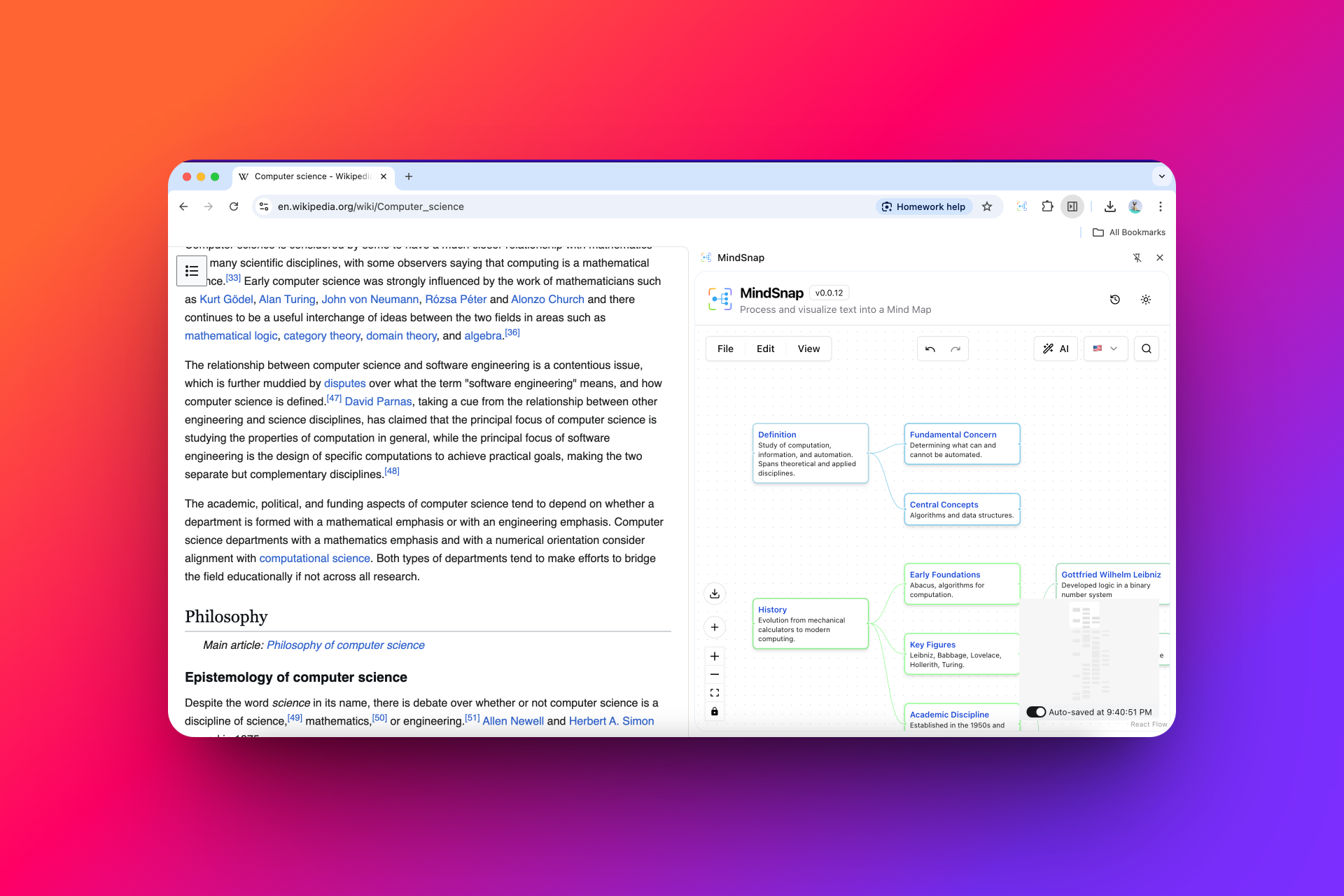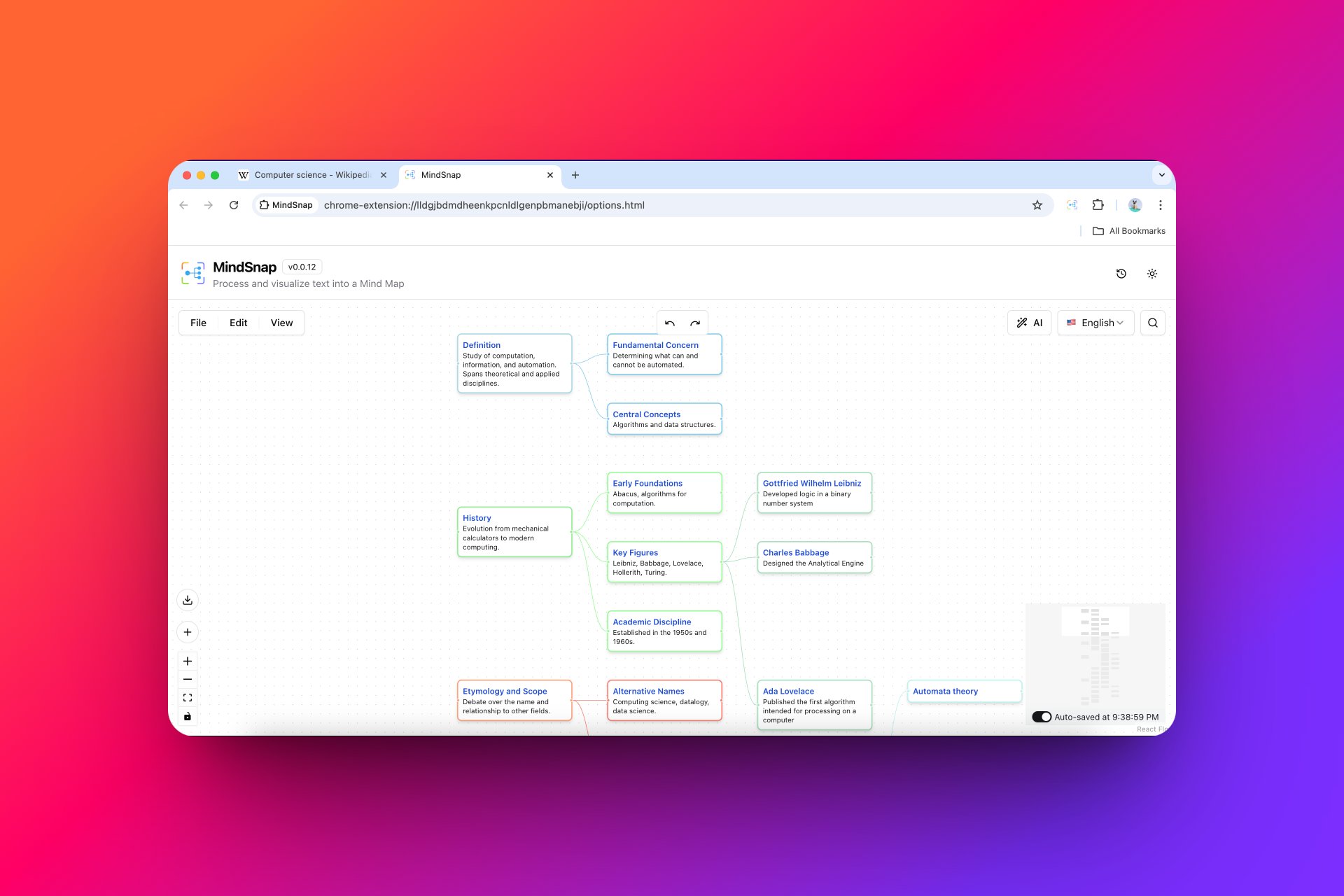Master MindSnap's Display Modes: Choose How You View Your Mind Maps


Master MindSnap's Display Modes: Choose How You View Your Mind Maps
One of MindSnap's most powerful features is its flexible display system that adapts to your workflow. Whether you prefer to keep everything in one place, work with multiple views, or focus entirely on your mind map, MindSnap offers three distinct display modes to match your needs.
The Power of Choice: Why Display Modes Matter
Different tasks require different approaches. Sometimes you need to reference the original content while editing your mind map. Other times, you want complete focus without distractions. MindSnap's display modes give you the flexibility to work exactly how you want, when you want.
Configuring Your Display Mode
Before diving into each mode, let's look at how to access these options. Simply:
- Open MindSnap by clicking the extension icon in your browser toolbar
- Access the configuration by clicking the settings/config button
- Choose your preferred display mode from the available options

The configuration panel is your control center, allowing you to customize not just display modes but many other aspects of your MindSnap experience.
Mode 1: Current Page Display
Perfect for: Quick analysis, minimal disruption, seamless browsing
The current page mode transforms your browsing experience by overlaying your mind map directly onto the webpage you're viewing. This mode is ideal when you want to:
- Quickly visualize content without leaving the page
- Maintain context with the original source
- Create mind maps during active research sessions
- Minimize tab clutter in your browser

Key Benefits:
- Seamless integration with your browsing workflow
- Contextual awareness - see your mind map alongside the source
- Quick access to both original content and visualization
- Minimal setup required
Best Used For:
- Research and fact-checking
- Quick content analysis
- Educational reading
- Casual mind mapping
Mode 2: Side-by-Side Display
Perfect for: Detailed analysis, content comparison, active editing
The side-by-side mode splits your screen, showing the original content on one side and your mind map on the other. This powerful layout enables true parallel processing of information.

Key Benefits:
- Parallel processing - work with both source and mind map simultaneously
- Easy reference - no need to switch between tabs or windows
- Enhanced comprehension - see connections between original content and visualization
- Efficient editing - make changes while referencing source material
Best Used For:
- Academic research and note-taking
- Content analysis and summarization
- Detailed study sessions
- Professional research projects
- Creating comprehensive mind maps from complex sources
Mode 3: New Page Display
Perfect for: Deep focus, complex mind maps, distraction-free work
The new page mode opens your mind map in a completely separate tab or window, giving you maximum screen real estate and zero distractions.

Key Benefits:
- Maximum focus - no distractions from original content
- Full screen utilization - more space for complex mind maps
- Independent workflow - work on mind maps without source interference
- Enhanced creativity - freedom to expand and modify without constraints
Best Used For:
- Creating large, complex mind maps
- Brainstorming sessions
- Final mind map refinement
- Presentation preparation
- Deep thinking and analysis work
Choosing the Right Mode for Your Task
For Quick Learning and Research
Recommended: Current Page Mode
- Ideal for absorbing information while browsing
- Perfect for educational content consumption
- Great for quick fact verification
For Analytical Work
Recommended: Side-by-Side Mode
- Best for detailed analysis requiring source reference
- Excellent for academic research
- Perfect for content comparison and synthesis
For Creative and Complex Work
Recommended: New Page Mode
- Ideal for brainstorming and creative thinking
- Best for creating comprehensive mind maps
- Perfect for focused, distraction-free work sessions
Pro Tips for Display Mode Mastery
- Switch modes dynamically - Don't stick to one mode; change based on your current task
- Use keyboard shortcuts - Learn the quick keys for switching between modes
- Consider your screen size - Larger monitors work better with side-by-side mode
- Match mode to content complexity - Simple content works well in current page, complex content benefits from side-by-side or new page
- Experiment with combinations - Try different modes for different phases of your work
Advanced Display Customization
Beyond the three main modes, MindSnap offers additional customization options:
- Opacity settings for overlay modes
- Size adjustments for side-by-side splits
- Position controls for optimal viewing
- Theme integration that works across all modes
Making the Most of Your Display Modes
The key to maximizing MindSnap's display modes is understanding that they're tools for different phases of your workflow:
- Discovery Phase: Use current page mode for initial content exploration
- Analysis Phase: Switch to side-by-side for detailed examination
- Creation Phase: Move to new page mode for focused mind map development
- Review Phase: Return to side-by-side for final verification against source
Conclusion
MindSnap's three display modes aren't just different ways to view your mind maps—they're different approaches to thinking and working with information. By mastering when and how to use each mode, you'll transform your productivity and create more effective mind maps.
Whether you're a student researching for a paper, a professional analyzing market data, or a lifelong learner exploring new topics, the right display mode can make all the difference in your MindSnap experience.
Ready to explore these modes yourself? Download MindSnap and discover which display mode works best for your unique workflow!
Have questions about display modes or other MindSnap features? Visit our support page or explore more tutorials in our blog.